Hamster in the Wheel – Credibility and EU Balkan policy
Dear friends of ESI,
Please find attached our latest report on the future of enlargement policy, Albania and North Macedonia:
Hamster in the Wheel
Credibility and EU Balkan policy
15 January 2020
Our paper outlines how it might be possible to open accession talks with both countries in 2020, restore credibility to the accession process for the benefit of all Western Balkan countries, establish a meaningful interim goal that depends on merit – joining the EU Single Market and the EU in a two-step process, like Finland did in 1994 – and convince EU sceptics of the merits of accession, based on strong track records.

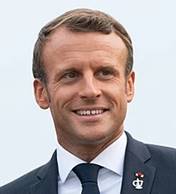
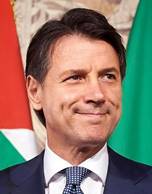
Could they agree on a way forward?
In April 2018 the European Commission recommended opening accession talks with North Macedonia and Albania. Since then the EU has divided into three groups of countries:
- The Netherlands are for opening talks only with North Macedonia. In June 2019, 105 out of 150 members of the Dutch parliament voted against starting talks with Albania.
- France and others do not agree to separate North Macedonia and Albania; they argue that it is better not to start talks with either.
- Italy insists that talks must start with both countries as soon as possible.
The result of this is a stalemate that has thrown EU strategy in the Western Balkans into total confusion. However, if Paris, Rome and The Hague could find a joint common position the rest of the EU might rally around it. Can this be achieved? A good starting point is to recognise that there is a deeper problem.
Fischer's crystal ball
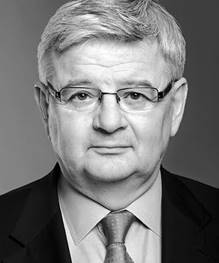
In 2010 European thinkers were asked about the shape of the European Union in 2030. Former German foreign minister Joschka Fischer predicted then that any "expansion of the EU to include the Balkan states by 2030 … [is] ruled out." His explanation: a deep European malaise. National positions across the EU are "simply too different."
A decade has passed. What happened since?
The last country to join the EU, Croatia, applied for accession in 2003. It joined the EU one decade after it had applied (2013).
North Macedonia applied for accession in 2004. It became a candidate within one year (2005). In the fourteen years since then it has not been allowed to start talks.
Montenegro applied for accession in 2008. It started talks four years later (June 2012). It has now been negotiating for almost eight years, already longer than Croatia. Of 35 negotiation chapters only 3 have been closed.
Serbia applied for accession in 2009. It started talks five years later (2014). It has, so far, closed 2 chapters.
Albania applied for accession in 2009, even before Serbia. One decade later it has not yet started talks.
Bosnia applied for accession in 2016. It has not advanced since.
Kosovo has been told that it cannot apply for EU accession, as its independence is not recognised by all EU member states.
This is a familiar scenario: never ending accession. Turkey applied for EU membership in 1987. It started accession talks 18 years later in 2005. It has been negotiating for 15 years since. It managed to close 1 chapter. And while the process was highly transformative early on, leading to positive reforms in Turkey between 2001 and 2010, it stopped being a motor for reforms at least a decade ago. The Western Balkans are currently on this trajectory. How to change it?
Hamster in a wheel

The French position is that the accession process itself needs to change. This is certainly true. Long before October 2019 the process was in desperate need of reform.
Look at the experience of Montenegro, which started talks in June 2012. During the past eight years Montenegro has "opened" all negotiation chapters except one. Many in the EU believe that opening a chapter is a carrot for a candidate. In fact, the only thing that happens when a chapter is "opened" is that the EU sets some conditions that must be met for this chapter to be closed one day in the future.
However, in eight years Montenegro has managed to close only three of 33 chapters. For two of these, Montenegro did not have to do anything: these were opened and closed on the same day. These are also the only (!) two chapters which Serbia was able to close in five years.
Recently things got stuck completely. In 2019 Montenegro has not opened or closed anything. Why? Did the government in Podgorica stop working? Or did the EU decide that it simply does not want the process to advance?
And: is opening chapters a meaningful achievement? Is life better for Montenegrin citizens as a result? According to the Commission's own assessments, between 2015 and 2019 Montenegro made no progress in 23 chapters; advanced in nine; and was backsliding in one. At this moment Montenegro is "well advanced" – the best grade – in none.
What is also striking: Montenegro stands today roughly at the same level of alignment as North Macedonia, across all 33 chapters. North Macedonia has not started accession talks yet. Things are no different for Serbia. Between 2015 and 2019 Serbia has remained at the same level of alignment in 27 chapters, became more prepared in five and was backsliding in one. At this speed it will only meet EU standards decades from now.
Imagine for a moment that France, Italy and the Netherlands agree to open talks with both Albania and North Macedonia, without any changes in the way accession talks are done. What would likely happen? Before long, both North Macedonia and Albania would lose momentum. And reformers there would feel like hamsters in a wheel, realising that regardless of how much effort they make, they would not be getting closer to joining the EU even by 2030.
Indispensable checklists
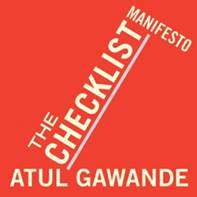

Atul Gawande
In 2011 a US doctor designed a checklist to tackle infections introduce by human error in hospitals. He plotted out the steps in order to avoid them. Doctors were supposed to:
"(1) wash their hands with soap
(2) clean the patient's skin with chlorhexidine antiseptic,
(3) put sterile drapes over the entire patient,
(4) wear a mask, hat, sterile gown, and gloves, and
(5) put the sterile dressing over the insertion site once the line is in.
Check, check, check, check, check. These steps are no-brainers; they have been known and taught for years. So it seemed silly to make a checklist for something so obvious. Still … in more than a third of patients, they skipped at least one step."
The impact of this checklist was dramatic: the ten-day line-infection rate went from 11 percent to zero.
This is just one of many examples in Atul Gawande's excellent book The Checklist Manifesto. There are many others about the importance of checklists for flying airplanes, for carrying out complex surgery, in the construction of skyscrapers by thousands of specialists and for the work of master chefs and their teams in restaurants. Without checklists, airplanes would crash more often, more people would die in intensive care, and good restaurants could not operate.
EU accession is a hugely complex task. Candidate countries need to carry out tens of thousands of steps, broken down into hundreds of different areas. EU officials, with a mandate to assess progress, need to keep track of an incredibly complex number of changes. At the same time politicians across Europe say that they want to follow what is happening, to grasp if news about reforms is real. Both such reforms and monitoring them is impossible without credible road maps and meaningful checklists. In fact, a well-designed accession process relies on quality checklists for results no less than an Airbus that is to be flown safely from Paris to Helsinki.
Vital signs and the rule of law
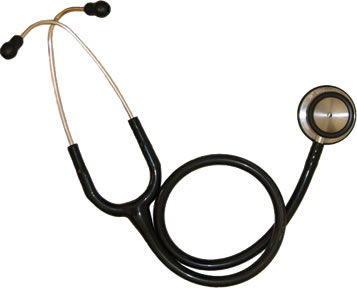
For what are the nuts and bolts of the accession process? They are to improve the quality of air, of road safety and of toxic waste dumps, of inspectors of slaughterhouses and supervisors of the financial sector. It is to verify whether a prospective new member has adopted the applicable EU laws and rules, has set up the institutions to implement them, and has the will and ability to do so. This is also crucially important when it comes to the rule of law. But how to monitor this?
Take the concept of vital signs, introduced in hospitals since the 1960s. Doctors and nurses in hospitals measure and record some things regularly for every patient: heartbeat, blood pressure, temperature, breathing, pain levels. These are crucial indicators of potential trouble.
Imagine EU expert groups carrying out in-depth assessments of key rule of law issues in all Balkan candidate countries from the outset in a similar manner. These would focus not on the institutional set-up but on outcomes. The following could be vital signs of democratic health to be checked regularly:
- Judiciary: In-depth monitoring of selected important trials (corruption, organised crime) in all countries, to assess whether the judiciary is truly independent under stress.
- Corruption: In-depth assessments of actual corruption experiences (not just perceptions) in different sectors of society, to see progress over time in reducing these.
- Security services: In-depth assessments whether security services (including the intelligence sector) are truly under parliamentary control – unlike the situation in North Macedonia under Nikola Gruevski.
- Media freedom: In-depth monitoring of all national broadcasters to assess pluralism in political coverage, using the methodology developed and used during election observation missions by the OSCE's Office for Democratic Institutions and Human Rights.
- How the weak are treated: In-depth assessment of how the weakest in societies are treated (orphans, prisoners, minorities), which is a good way to assess not just human rights, but also institutional capacity.
In addition, imagine the European Commission drawing up quality chapter-checklists for each policy area (chapter) to set out clearly the following:
- EU regulations and directives that need to be transposed and implemented, broken down by area.
- Lists of institutions necessary to enforce EU rules. This includes the judiciary, since rules which cannot be enforced in national courts are useless. National courts are central to EU accession also because they become EU courts – required to defend EU rules – on the day of membership.
Currently the accession process seems impossible to explain to laypersons; it appears arbitrary and thus purely political, where a few chapters can be opened and closed in one day and all others cannot be closed in eight years. However, at times of mistrust and suspicion only transparency and clear criteria can restore credibility. And make the European Commission a central actor again.
The Finnish path to membership

The EU needs to square the North Macedonia/Albania circle urgently. It must also reform the process. Here are four ideas, all discussed in more detail in our Hamster report:
1. A two-stage process
The goal of talks remains full accession, while the intermediate goal is to offer Single Market entry. In a paper circulated in late 2019 France suggested seven different stages. This idea can be simplified to two stages. The first stage is joining the Single Market and implementing all policy reforms needed to do so. This has also been the Finnish (and Swedish) road to accession, as Finland first joined the Single Market in 1994, before becoming a full member in 1995.
2. Opening and closing all chapters together
Instead of opening and closing chapters one by one, they could all be opened at the beginning and closed all at once. In any case this is no measure of progress.
3. The rule of law becomes truly central
With a two-stage process there would be a meaningful goal within reach. But rule of law conditions would be as demanding for joining the Single Market as for full membership, and monitoring of these even stricter. In this way the EU regains leverage in the next years.
4. Reversibility
If any country seriously violates basic human rights or undermines the independence of the judiciary it should be possible to suspend the accession process more easily, with just a simple majority of members voting. Suspension should have real effects such as freezing pre-accession funding. And it should also be possible to restart it with a simple majority so that there is less reluctance to suspend it.
The question of motivation

The question of a child and the role of civil servants (8 December 2019)
Our new report sets out a way to change the trajectory of a never-ending non-transformative process.
EU Balkan enlargement is only possible if it is deeply transformative. None of the current candidates and potential candidates have a chance of joining without a deep transformation of their institutions and economies. The Balkan enlargement process is not transformative right now. It does not inspire politicians or thousands of civil servants to make the focused and intense efforts that are required to transform Montenegro or Serbia, Kosovo or Bosnia and Herzegovina. Currently countries are trapped in a vicious circle of low expectations and few reforms. This is as true for frontrunners (Montenegro, Serbia) as for laggards (Bosnia and Herzegovina, Kosovo).
In recent years countries which believed that they are about to start accession talks have worked hard towards them as a meaningful and inspiring interim goal. Politicians in Montenegro (before and right after accession talks began in 2012), Serbia (between 2010 and 2014), North Macedonia (at the time of answering the questionnaire and gaining candidate status 2004-2005 and again between 2017 and today), Albania (since 2014) and also Turkey (between 1999 and the start of accession talks in 2005) managed to carry out difficult reforms.
Why did the goals of obtaining candidate status and then starting talks, which fall very much short of full membership, inspire reforms? Because they were seen as meaningful: taking countries closer to the ultimate goal of membership; depending on a country's own efforts. It also seemed clear to politicians and civil servants what needed to be done.
Today, after talks start, the prospect of joining disappears into the distant future. Whether a country becomes a full member will not depend on its efforts alone. It depends on the state of the EU in an uncertain future. This means that currently, once talks start, credible interim goals disappear. The opening of chapters is NOT a credible interim goal. And money is not a strong tool to incentivise this change. Serious EU money takes many years to programme and spend. For civil servants this is more work. For politicians it is no quick reward. More money would be very useful to support reformers; but it cannot create them.
Joining the Single Market by 2025 would be a realistic goal for Balkan frontrunners. Joining the Single Market by 2030 should be a realistic goal for all Western Balkan countries. They would then enjoy the four freedoms – the free movement of goods, capital, services, and labour – that Norway and Iceland enjoy today. For this the rule of law is crucial: only by protecting it will countries be allowed to join the Single Market and only by preserving it can they become full members. This is not a detour, but a station on the road to full accession. It is the boldest realistic proposal on the table now. If Paris, The Hague, and Rome agree on it, it could happen.
Why bother? Think of Romania
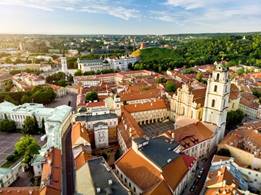
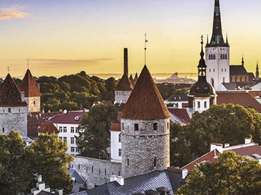
Vilnius – Tallinn
Finally, what are the ultimate incentives for societies and leaders in the region are to take part in such a process? Why is it good to join the biggest Single Market in the world? The best answer is short: Lithuania. Estonia. Romania.
Lithuania went from 37 percent of EU average GDP per capita in 1999 to 81 percent in 2018.
This is remarkable: in 1999, the year when the Helsinki summit in December decided to start accession talks with Lithuania, the country had a per capita GDP that was just a third of the average of the 28 countries that today make up the EU. One decade later, by 2009, it stood at half the EU average. Today it stands at 81 percent. It is an extraordinary convergence. But it is not unique.
Estonia stood at 40 percent of the EU average per capita GDP in 1999. By the time it joined the EU in 2004 it had already reached 54 percent. In 2018 it stood at 82 percent.
Romania stood at 26 percent in 1999 when accession talks were opened. It was then the poorest candidate country. In 2018 it stood at 66 percent.
Catching up is possible. North Macedonia today is at the level of development where Lithuania was in 1999. Serbia today is where Estonia was in 1999. Bosnia 2018 is the Romania of 1999. Countries can change. Enlargement policy can have a major impact. For this it must be credible, merit based and serious. It has happened before. It can happen again.
Best regards, and all the best wishes for 2020 from the whole ESI team,

Gerald Knaus
Further reading
NEW Hamster in the Wheel - Credibility and EU Balkan policy (15 January 2020)
Coup de grâce – Delors and squaring the circle – Norway in the Balkans (25 October 2019)
Accession revolution in Brussels – a new flagship – Usain Bolt and statistics (9 November 2015)
The Chapter Illusion – For honesty and clarity in EU-Turkey relations (15 May 2017)
Enlargement and Impact – Twelve ideas – Dummy Report (Paris) (28 January 2015)
Enlargement 2.0 – The ESI Roadmap Proposal (Belgrade) (27 November 2014)
Timisoara 2.0 (May 2014)
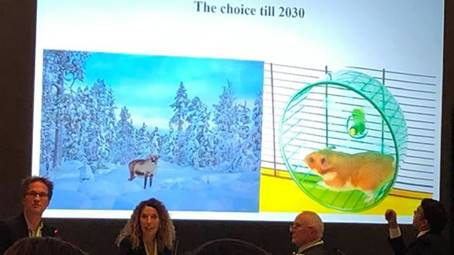
Presentation of ESI Finland proposal in Berlin in December 2019
ESI videos, podcasts, media
NEW What is more important: Political will or accession methodology? (7 December 2019)
NEW 101 On the French Veto, Balkan accession and what next (18 November 2019)
NEW Politico Europe PODCAST: A new plan for EU hopefuls (14 November 2019)
Some media reactions
Nova (North Macedonia), "Knaus za NOVA: Evropska ekonomska zona e podobro od ova status kvo" ("Knaus for NOVA: The European Economic Area is better than this status quo") (30 October 2019)
Koha, Veton Surroi, "Kosova si Norvegjia, Serbia si Zvicra" ("Kosovo as Norway, Serbia as Switzerland") (1 November 2019)
DW, "'Norveški model' – vrabac u ruci za Srbiju i komšiluk?" ("'Norwegian model' - a sparrow in hand for Serbia and the neighbourhood?") (3 November 2019)
NRC (The Netherlands), Caroline de Gruyter, "Poetin speelt stratego in onze binnentuin" ("Putin plays Stratego in our inner garden") (8 November 2019)
Der Spiegel, Markus Becker, "Streit über neue EU-Mitglieder - Frankreichs fatale Blockade" ("Fallout over new members - France's fatal blockage") (19 November 2019)
Die Welt, Thomas Schmid, "Der kleine König Macron, die Schwäche der EU und der Balkan" ("Little King Macron, the EU's weakness, and the Balkans") (21 November 2019)
Neue Zürcher Zeitung, Andreas Ernst, "Macron sagt nicht nur Nein – der französische Vorschlag für die Erweiterung der EU" ("Macron doesn't just say no - the French proposal for EU enlargement") (21 November 2019)
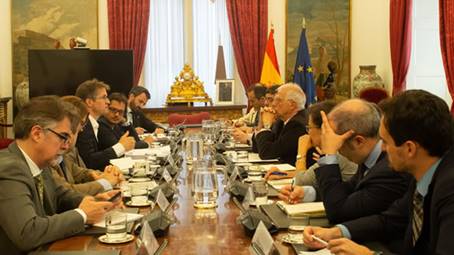
Presentation of ESI proposal in Madrid at invitation of Foreign Minister Borrell
Presentations
Berlin (12 December), Tirana (12 December), Brussels (9 December), Berlin (6 December), The Hague (4 December), Sarajevo (28 November), Vienna (27 November), Rome (20 November), Sofia (11 November), Madrid (7 November), Visby (28 October), Paris (10 October), Zagreb (16 October)
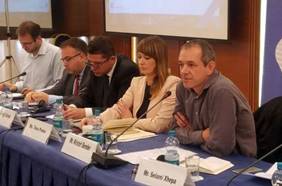
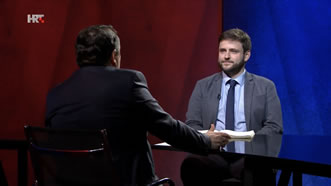
Kristof Bender in Tirana – Adnan Cerimagic on TV in Zagreb

